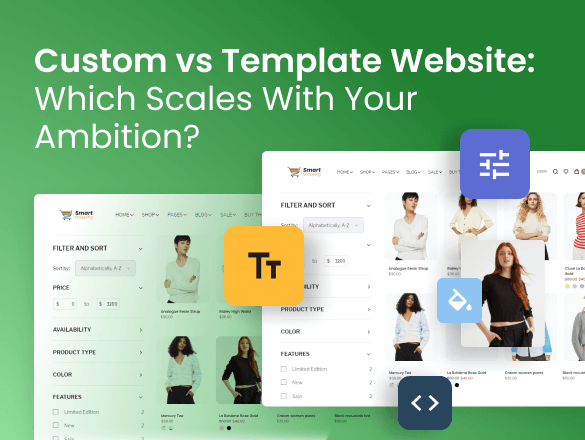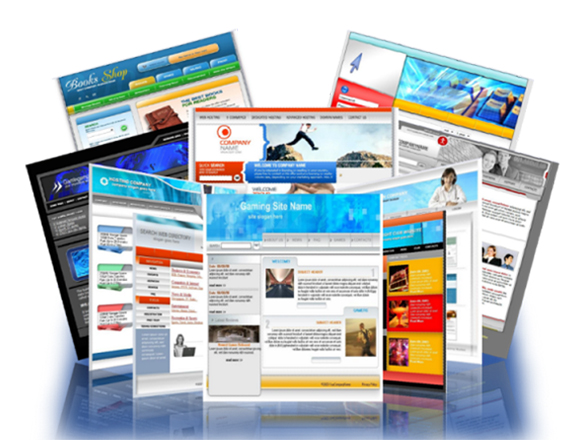Custom vs Template Website: Which Scales With Your Ambition?
When building a website, one of the first decisions you’ll face is whether to go with a custom website design or use a template website. This choice can significantly impact your site’s performance, branding, and long-term scalability. Whether you’re launching a new brand or refreshing an existing one, understanding the difference between custom vs template websites is crucial.
In this article, we’ll break down the pros and cons of each, help you decide what’s best for your business, and suggest the ideal moments to consider magento custom development services.
Quick Post Navigation:
Ready to explore whether a template website is right for you — or if you’ll need something more custom? Contact us today for a free consultation, and let’s discuss the best website solution for your business goals.
What Is a Custom Website?
A custom website is a fully tailored, built-from-scratch website designed to meet the specific needs, goals, and identity of your business. Unlike template websites, which work within pre-made layouts, a custom website gives you complete control over the final product — from layout and functionality to performance and integrations.
A custom website isn’t just about visual design; it’s about delivering a unique, purpose-built online experience. Behind the scenes, developers and designers work together to ensure the site’s structure, features, and user journeys are crafted to match your brand’s exact requirements, whether you need custom checkout flows, advanced search tools, multilingual support, or deep integrations with third-party systems.
For ecommerce businesses, the difference is even more pronounced. Platforms like Magento or Shopify offer robust foundations for building sophisticated, scalable custom websites that go far beyond what most pre-built systems can handle. For example, if you need full control over product management, backend workflows, or multi-store operations, a custom Magento website can deliver the advanced solutions your business demands.
What Is a Template Website?
A template website is a complete site built using a pre-designed template — a ready-made layout or theme — that allows businesses to launch online quickly without starting from scratch. Platforms like Wix, Squarespace, and WordPress (explored in more detail in our Squarespace for Small Businesses and Wix Ecommerce Review articles) offer vast libraries of templates designed for different industries, making it easy for users to customize content, images, and branding with minimal technical effort.
The main appeal of a template website lies in its affordability and speed to market. For startups, small businesses, or anyone needing a professional online presence on a tight budget or deadline, template websites provide a practical, low-barrier entry point.
However, this convenience comes with trade-offs.
Template websites often have limited customization options — meaning you’re working within the design and functionality constraints set by the template. As a result, achieving a truly unique brand identity or implementing advanced features can be challenging, especially if many competitors are using similar layouts.
Template vs Custom Website: Key Differences
Here’s a quick comparison to help you weigh the two options:
| Feature | Template Website | Custom Website |
|---|---|---|
| Cost | ✅Low upfront cost | ❌Higher investment |
| Launch Time | ✅Fast (days to weeks) | ❌Longer (4–12+ weeks) |
| Brand Uniqueness | ❌Limited customization | ✅Fully branded and unique |
| Functionality | ✅Basic to moderate | ✅Advanced and tailored |
| SEO & Performance | ❌Often generic or poorly optimized | ✅Optimized for speed and SEO |
| Scalability | ❌Difficult to scale | ✅Built for growth |
A template website might save you time and money upfront — making it an attractive choice for small businesses, startups, or MVP projects. But as your business grows, the limitations can become more apparent. Many templates are not fully optimized for speed or SEO, and their fixed structures can make it difficult to stand out, especially if competitors use similar layouts.
In contrast, a custom website is crafted specifically for your brand, business goals, and audience needs. Every part — from the design to the user experience — is purpose-built to support your unique value proposition. This gives you the flexibility to add advanced features like tailored checkout flows, CRM or ERP integrations, and multilingual or multi-location support.When it comes to ecommerce, the difference between a template website and a custom website is even more critical. A template-based store may struggle with advanced filtering, custom product displays, or scalable backend operations. If you’re working on a Magento store, for example, Magento custom development ensures your site is mobile-optimized, scalable, and ready to handle heavy traffic — all while delivering a seamless, high-converting user experience.
Which Ranks Better on Google?
When deciding between a template vs custom website, it’s important to consider how each option impacts Search Engine Optimization (SEO)—a key driver of long-term visibility and traffic.
Templates: Quick Start, Limited SEO Power
A template website offers a fast, affordable way to get your business online. For many small businesses, startups, or personal projects, it’s a smart way to launch quickly without the time or cost of a fully custom build.
While template websites provide a strong foundation, there are SEO and performance considerations to keep in mind:
- Extra Code Overhead: Many templates include scripts and styles for various use cases — this can lead to slower load times and lower SEO scores.
- Generic Structure: It can be challenging to fully optimize headings, internal links, or schema markup when working within a preset layout.
- One-Size-Fits-All Approach: Template websites prioritize convenience and broad appeal, not the specific technical or SEO needs of your business or industry.
That said, template websites can be customized to better align with your goals. With the right development help, you can optimize performance, enhance SEO, and tailor features to better fit your unique business needs — making a template website much more than just a basic out-of-the-box solution.
Want to optimize your template website for better SEO, performance, or functionality? Contact us today to explore how we can customize and enhance your website to help your business grow – whether you’re using Wix, Squarespace, or other template website builders.
Custom Websites: Built to Compete
If SEO is essential to your business goals—especially for competitive markets or ecommerce—a custom website offers significant advantages.
With full control over structure, performance, and content, custom-built sites enable:
- Clean, optimized code for faster loading.
- Tailored SEO strategies, from metadata to mobile responsiveness.
- Custom internal link architecture and semantic HTML.
- Scalable frameworks that grow with your SEO needs.
- Advanced technical SEO, like structured data and indexation controls.
A custom website is built with your long-term SEO success in mind, not just a quick launch.
Making the Right Choice: Template vs. Custom Website for Your Business Goals
The choice between a template website and a custom website isn’t just about design preferences — it’s a strategic business decision that should align with where your company is today and where you want it to go.
When a Template Website Makes Sense
A template website is often the smartest, most efficient solution when:
- Speed and Affordability Matter Most: You need to launch quickly and stay within a tight budget — for example, a new startup, side project, or early product test.
Standard Functionality Is Enough: You only need basic features, such as informational pages, a blog, or a simple contact form.
You’re Testing or Validating an Idea (MVP): You want to get a minimum viable product live, gather user feedback, and adjust quickly without heavy upfront investment. - You Have Limited Internal Resources: If your team lacks in-house technical expertise or development capacity, a template website lowers the barrier to entry and simplifies maintenance.
While a template website can serve these needs well, it’s important to recognize its built-in limitations. Over time, you may find the lack of customization, limited scalability, or generic branding becomes a roadblock — especially as your business grows or as you introduce more complex features like ecommerce.
When a Custom Website Becomes a Strategic Investment
Investing in a custom website becomes the stronger choice when:
- Brand Differentiation Is a Top Priority: You want to create a truly unique online presence that sets you apart in your industry.
- You’re Planning for Growth and Scalability: You anticipate rising traffic, expanding content, or feature complexity and need a platform that can evolve with you.
- Advanced Functionality or User Experiences Are Required: You need tailored user journeys, custom tools (like interactive dashboards or custom calculators), or deep integration with internal systems like CRMs, ERPs, or marketing automation.
Ecommerce Is Core to Your Business: If you’re running or planning a feature-rich online store — especially on platforms like Magento — custom development is essential for performance, scalability, and delivering a smooth, conversion-focused shopping experience.
Ready to take the next step?
Reach out to us for expert advice. We’ll help you assess your options and find the right solution to match your goals and budget.
Frequently Asked Questions (FAQ)
Can I start with a template and switch to custom later?
Yes, absolutely.
Many businesses start with a website template to launch quickly and test their idea. Later, as their needs grow, they transition to a custom website for more flexibility, performance, and brand alignment.
Just keep in mind:
- Migrating content and features can take time and planning.
- Not all platforms make it easy to export data from templates.
- It’s best to build with scalability in mind, even if you’re starting simple.
Starting with a template is a valid approach—just make sure your long-term vision includes a plan for scaling when needed.
Which platform is better for custom ecommerce development: Magento or Shopify?
It depends on your business needs. Magento offers unmatched flexibility and control, making it ideal for complex, large-scale stores with custom functionality. Shopify, while less customizable at the code level, is user-friendly and faster to launch, making it a strong choice for growing businesses that want a streamlined ecommerce solution. Read our full Magento vs Shopify comparison to find the best fit.




